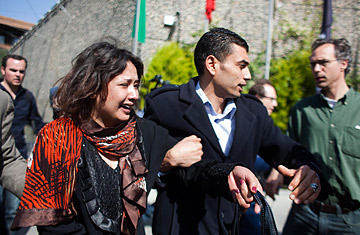
A Ministry of Information official with Iman al-Obeidi in Tripoli on March 15, 2011
(2 of 2)
"The key question right now is the extent to which this violence is being perpetrated by [Gaddafi] forces and how much is civilian men taking advantage of the breakdown in law and order," says Liesel Gerntholtz, women's-rights director at Human Rights Watch. "I would question how pervasive it is and whether it is in fact a Gaddafi policy because we just don't know. There's been enough evidence in the media, and we've tracked a lot of claims on Twitter and social-media pages, that I believe there is something to be concerned about. There's definitely been sexual violence. But we're not in a position to make any claims about the extent of it or who's doing it."
So far, the only Libyan woman to go on record about her assault has been Iman al-Obeidi, who in March burst into Tripoli's Rix Hotel to tell foreign journalists she had been gang-raped by Gaddafi's forces. Though aid workers had hoped she might open the floodgates for other women to come forward, none have. (Al-Obeidi is now in Romania, seeking refugee status.) "The allegations are frequent and serious," says Sidney Kwiram, Libya researcher at Human Rights Watch, who says that in more than two months on the ground she was unable to find one woman who would speak on the record. "Research on rape is often challenging due to the shame and taboo, not just for the woman but for the whole family. It is particularly difficult in Libya because of the conservative nature of the society and the hyperpoliticized environment we are operating in."
Another disincentive is the lack of protection for any woman who comes forward as a victim. Benghazi's checkpoints are patrolled by untrained vigilantes wielding duct-taped guns. Harassment and assault happen regularly on the city's main streets, in daylight. Donatella Rovera, Amnesty International's crisis researcher, points to security concerns expressed by al-Obeidi, who despite a modicum of protection due to international attention "had a well-founded fear of persecution." In Benghazi, Bugaighis says the women she treats for postrape psychological and physical trauma beg her to keep their identities secret. "For them, the implications of rape are that they may not be able to fit back into society — the fear of this happening to them is what's keeping them from talking."
Documented attacks on migrant women, especially those from sub-Saharan Africa, have shed some light on what could be happening to their Libyan counterparts. Rovera says she heard testimony from non-Libyan migrants "who were subjected to rape and kidnapping and were being held for ransom, and other things that were happening with impunity." Then al-Obeidi arrived at the Rix Hotel, and the focus "changed. We were now talking about a Libyan national. And that's an element that we were certainly less aware of before."
In light of the ICC's decision, international attention looks set to grow, as does speculation on the number of victims. So far it is impossible to know, though the ICC said June 9 that the figure was in the hundreds. "The number of rape victims will shock everyone when it comes out," Dr. Bugaighis says.
But rights workers who have spent substantial time on the ground chasing leads maintain that while they remain aware of the assault rumors, the key objective going forward will be to get Libyan victims to share their stories. In three months in Libya, Rovera didn't meet one woman who said she had been raped. "Normally the situation is the reverse — you don't get many people to focus on it in society, but you can get the victims to talk," she says. "Here everyone's talking about it, but despite our best efforts, we've not been able to meet a single victim."
